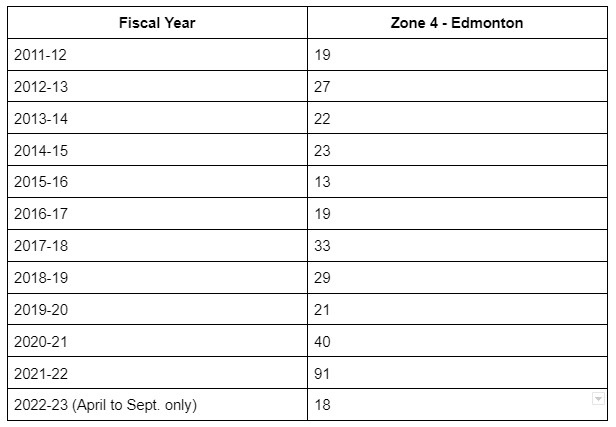Amputations due to frostbite on the rise in Edmonton medical zone
Amputations due to frostbite in the Edmonton medical zone have hit a 10-year high, according to data from Alberta Health Services.
In the 2021-22 fiscal year, 91 amputations due to frostbite were recorded.

AHS attributes the increase to the increasing number of unhoused people exposed to harsh winter conditions.
Additionally, AHS spokesperson James Wood says fentanyl overdoses over the past three to four years have also contributed to higher numbers of people suffering frostbite.
He added that emergency room visits for frostbite were also up in 2021-22 for similar reasons.
“While not all homeless are unhoused during the cold winter months, many struggle with multiple issues including mental health, addictions, and general health problems. Barriers to accessing community and health supports, especially during the pandemic, were also compounding factors that may have contributed to higher incidents of frostbite-related amputations,” Wood wrote in a statement to CTV News Edmonton.
According to Wood, amputations are only performed in frostbite cases when tissue will not heal or the digit or limb has become severely infected and is threatening a person’s life.
'ALARMING AND TROUBLING DATA'
The numbers don’t come as a surprise to people who work with at-risk Edmontonians.
“This is very alarming and troubling data that we’ve received, but it does correspond with what we’re seeing on the ground and at our facilities and in our programs,” Elliott Tanti of Boyle Street Community Services (BSCS) told CTV News Edmonton.
“We regularly encounter people with amputations related to frostbite, people with severe mobility issues. Accessibility is always an issue for those we serve, and many of those ailments are related to amputations related to frostbite.”
Tanti says he hopes the information will change how Edmontonians view the at-risk people in their community.
“A lot of the conversation in the last little while around homelessness has been really focused on public safety, and this is really a public health issue. We need to bring compassion and dignity and care back into the way we’re looking at homelessness.”
“We need to be shifting away from narratives of how homeless folks are unsafe for others and how they’re actually living incredibly unsafe lives.”
He added that BSCS plans to use the numbers to advocate for more support and more diverse spaces for their clients.
“We need better infrastructure in our downtown communities in the core. It's why one of the focuses of our organization is a new building that’s accessible, it’s because we’re seeing this more and more regularly.”
In November, the city revoked the development permit for a new BSCS building two blocks north of its current site.
Correction
A previous version of this story showed an incorrect number of amputations due to frostbite.
CTVNews.ca Top Stories

5 rescued after avalanche triggered north of Whistler, B.C. RCMP say
Emergency crews and heli-skiing staff helped rescue five people who were caught up in a backcountry avalanche north of Whistler, B.C., on Monday morning.
Quebec fugitive killed in Mexican resort town, RCMP say
RCMP are confirming that a fugitive, Mathieu Belanger, wanted by Quebec provincial police has died in Mexico, in what local media are calling a murder.
Bill Clinton hospitalized with a fever but in good spirits, spokesperson says
Former President Bill Clinton was admitted Monday to Georgetown University Medical Center in Washington after developing a fever.
Trump again calls to buy Greenland after eyeing Canada and the Panama Canal
First it was Canada, then the Panama Canal. Now, Donald Trump again wants Greenland. The president-elect is renewing unsuccessful calls he made during his first term for the U.S. to buy Greenland from Denmark, adding to the list of allied countries with which he's picking fights even before taking office.
UN investigative team says Syria's new authorities 'very receptive' to probe of Assad war crimes
The U.N. organization assisting in investigating the most serious crimes in Syria said Monday the country’s new authorities were “very receptive” to its request for cooperation during a just-concluded visit to Damascus, and it is preparing to deploy.
Pioneering Métis human rights advocate Muriel Stanley Venne dies at 87
Muriel Stanley Venne, a trail-blazing Métis woman known for her Indigenous rights advocacy, has died at 87.
King Charles ends royal warrants for Ben & Jerry's owner Unilever and Cadbury chocolatiers
King Charles III has ended royal warrants for Cadbury and Unilever, which owns brands including Marmite and Ben & Jerry’s, in a blow to the household names.
Man faces murder charges in death of woman who was lit on fire in New York City subway
A man is facing murder charges in New York City for allegedly setting a woman on fire inside a subway train and then watching her die after she was engulfed in flames, police said Monday.
Canada regulator sues Rogers for alleged misleading claims about data offering
Canada's antitrust regulator said on Monday it was suing Rogers Communications Inc, for allegedly misleading consumers about offering unlimited data under some phone plans.
































